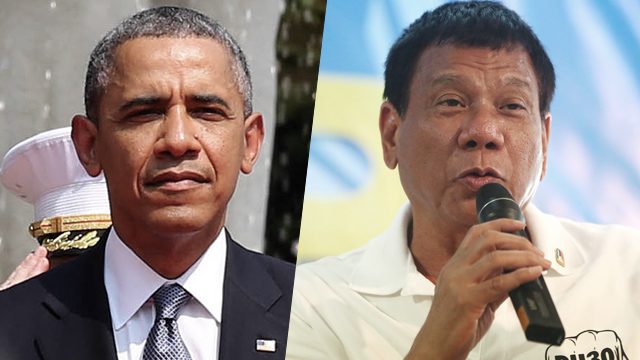SUMMARY
This is AI generated summarization, which may have errors. For context, always refer to the full article.

When President Rodrigo Duterte says the Philippines is not a vassal state of the United States of America, or when he insists that he wants to pursue an “independent foreign policy,” he is actually echoing a policy enshrined in the Philippine Constitution.
Article II, Sec. 7, of the Constitution states: “The State shall pursue an independent foreign policy. In its relations with other states the paramount consideration shall be national sovereignty, territorial integrity, national interest, and the right to self-determination.”
Interestingly, no Philippine president since perhaps Manuel Luis Quezon, who said he’d rather have a country run like hell by Filipinos than one run like heaven by Americans, has expressed adherence to such a policy in such strong terms as Duterte.
Why is it that in the Philippine context, an independent foreign policy is necessarily antagonistic to the US and its interests? A quick reading of history shows why.
Ever since the Americans duped Aguinaldo, Buencamino and Paterno et. al. in 1898, the US has practically dictated the way we relate with it and the rest of the world. This the Americans did as our colonial masters from 1902 to 1946 and as our neocolonial puppeteers from 1946 to the present. Pres. Duterte’s graphic photo of American soldiers stepping on the dead bodies of Moros in the massacre of Bud Dajo is but the tip of the iceberg of a long and brutal history of US domination and intervention in our affairs.
Even as the US granted us independence after the Japanese liberation, it attached a bundle of strings that tied our political and economic development to America’s imperialist agenda (e.g. The Bell Trade Act, RP-US Military Bases Agreement, RP-US Military Assistance Agreement, the Mutual Defense Treaty, among others.) This was followed by onerous agreements and harsh impositions under US-led multilateral agencies like the International Monetary Fund (IMF), World Bank (WB), and General Agreement on Tariffs and Trade – World Trade Organization (GATT-WTO) which strengthened our neocolonial trade and investment policies, making us even more hostage to US economic policy.
Ferdinand Marcos brought US subservience to a new low by forcing on our people a brutal fascist dictatorship in service of US imperialism. Thus did the US extend full political, military and economic support to his regime till its ouster in 1986. His successor Pres. Corazon Aquino could have, but refused to, implement an independent foreign policy. On the contrary, she vowed to pay every penny of Marcos’ odious debt to US, European and Japanese banks and vehemently opposed the Senate’s historic abrogation of the RP-US Military Bases Agreement in 1991. She followed to the hilt the IMF and WB’s conditionalities and structural adjustment programs.
Later on the Ramos government, through the USAID-funded Accelerating Growth Investment and Liberalization with Equity (AGILE) project, dismantled whatever support and protection was left for local producers in order for US and other foreign investments to expand and dominate the local economy. In our ascension to the WTO, Philippine negotiators were only too eager to lower our trade barriers to the detriment of our local producers, who until now have never fully recovered from globalization’s onslaught.
In 1999, the Estrada government allowed the return of US military troops under the RP-US Visiting Forces Agreement (VFA). This was followed by the Mutual Logistics and Supply Agreement (MLSA) approved under Pres. Arroyo and the Enhanced Defense Cooperation Agreement (EDCA) approved under Pres. Aquino. All together, these agreements now make it possible for the US to install a string of US military facilities all over the archipelago to serve as forward bases in its pivot to Asia, including it’s power play with China.
Cutting off ties with America?

To sum it up, our colonial past and neocolonial present have made the Philippines not only a US military outpost in Southeast Asia but a source of its cheap labor and raw materials, a steady market for its goods and a profitable investment site for its transnational corporations. All these at the expense of national sovereignty and our own development as a modern, self-reliant and industrial economy. No wonder that despite our overly rich natural resources and highly talented, young and growing population, we remain a poor and underdeveloped country, sliding in status from Asia’s number 2 in the 50s to it’s proverbial sick man today.
It is in this light that an independent foreign policy becomes so important. Such a policy should necessarily depart from decades of US-imposed political and economic programs and help us break free from the colonial mentality that has debilitated us as a nation.
Does an independent foreign policy mean cutting off ties with America?
Only a fool would think that. But surely, it requires a much-needed and long-delayed redefinition of our “special relations” with the US. For no other country has trampled on our national sovereignty, territorial integrity, national interest, and the right to self-determination more than the United States of America. Not Spain, not Japan, not even China despite its illegal and despicable actions in the West Philippine Sea.
If President Duterte is serious in pursuing an independent foreign policy, he should go beyond bad mouthing Barack Obama or giving the EU the finger. Of course kicking out the US troops from Mindanao and engaging China in bilateral talks over the West Philippine Sea is a good start.
But to be truly meaningful, such a policy should be translated into bolder diplomatic actions and thoroughgoing political and socio-economic reforms that hold our sovereignty, territorial integrity, national interest and right to self determination above any foreign power. – Rappler.com
The author is a former representative of Bayan Muna in the House of Representatives.
Add a comment
How does this make you feel?
There are no comments yet. Add your comment to start the conversation.